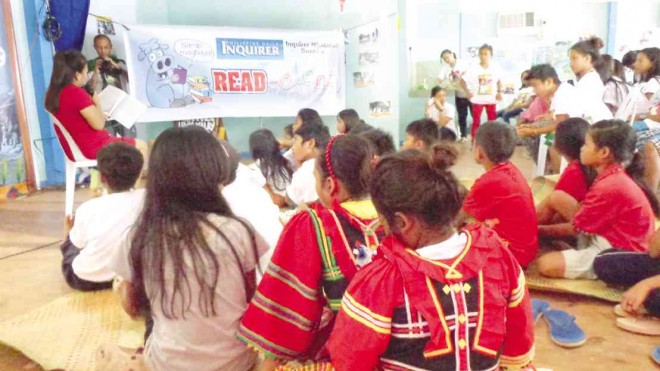
“LUMAD” children listen as Rosalinda Pimentel, wife of Surigao del Sur Gov. Johnny Pimentel, reads a story during Inquirer’s Read-Along session in Cortes, Surigao del Sur province, on Oct. 7. FRINSTON L. LIM
Stories about resistance and heroism for the defense of one’s community hit home for some 30 lumad (indigenous) children who attended Inquirer’s Read-Along session in Cortes, Surigao del Sur province, on Wednesday.
They are part of more than 3,000 people who fled five towns in the province last month after the rampage of anticommunist militias in Lianga, or over 100 from all over Mindanao who were attending a children’s congress and whose communities were caught in the crossfire between government forces and rebels.
Two women have become virtual mothers to the bakwit (evacuees), reading them stories about the courage of Kalinga and Bontoc peoples in opposing the Chico River hydroelectric dam in the 1970s that they claimed would have submerged their farms and homes.
Chico Dam fight
Rosalinda Pimentel, a Philippine Red Cross volunteer and wife of Gov. Johnny Pimentel, read Luz Maranan’s “Ang Pangat, Ang Lupang Ninuno at ang Ilog (The Chieftain, the Ancestral Land and the River),” which tells the story of Apo Macli-ing Dulag, an Igorot chieftain who was killed for leading the tribes against the government’s dam project during the Marcos regime.
Maranan’s story won third prize in the Carlos Palanca Memorial Awards for Literature in 2012.
May Navidad Salinas, provincial social welfare development officer, read “Dumaloy ang Ilog Chico,” a story written by Judy Carino and Rene Villanueva that narrates how the children, women and the elderly joined the campaign to drive soldiers, foreign contractors and other “strangers” behind the dam out of their communities.
As “mother of the province,” Rosalinda Pimentel said she was happy to share her time and read to the kids. The read-along, she said, helped enormously to ease the stress felt by the children who were uprooted from their communities.
“I really pitied them. They’re not supposed to be there (in the evacuation center). They should be protected,” she said.
Children’s congress
The Inquirer Read-Along was conducted on the sidelines of the 1st Mindanao IP Children’s Summit at a beach resort in Balibadon village in Cortes. Hundreds of tribal children from Caraga, Davao and others regions in Mindanao attended.
The summit came on the heels of a massive evacuation of lumad residents in Surigao del Sur due to alleged violence and threats by tribal militias said to be supported by the government.
Salinas said the children were enthusiastic and eager to answer end-of-story questions, because the tales were interesting and resonated with their own experience. She also translated the story from Filipino into Cebuano, and cited local examples, like the Subang Hubo for the Chico River, thus keeping the young listeners’ interest and attention.
“Actually, those kids were fun to be with. They learned quickly by the way they showed enthusiasm in answering questions,” she noted.
Both women said it was their first time to read to the children, ages 10 to 12.
Uprooted children
Twelve-year-old Adrian, an elementary school student of Alternative Learning Center for Agricultural Livelihood and Development in Han-ayan in Diatagon village, Lianga, said he admired the courage shown by Apo Macli-ing and the people in their village in their fight to keep their homes and farms.
But he said he was saddened by the fate of the chieftain, and likened it to what had befallen his father, Dionel Campos, who was among the three people killed when a Manobo paramilitary group called Magahat-Bagani Force raided their village last Sept. 1 that resulted to their exodus.
For Jayson, also a child from Diatagon, what struck him were the mothers and daughters around Chico River who bravely went to the soldiers’ camp and, without using any weapon, drove them away and prevented the dam’s construction.
“They even took off their clothes and were not ashamed,” he said.
Salinas said she “felt very happy for sharing [my time] with them. I appreciate much their participation and interest.”
On Thursday, Salinas also read to the children in the evacuation camp at the capitol grounds in Telaje, Tandag.
“This is one activity that will help in debriefing children from traumatic experiences,” said the 34-year social work veteran.

